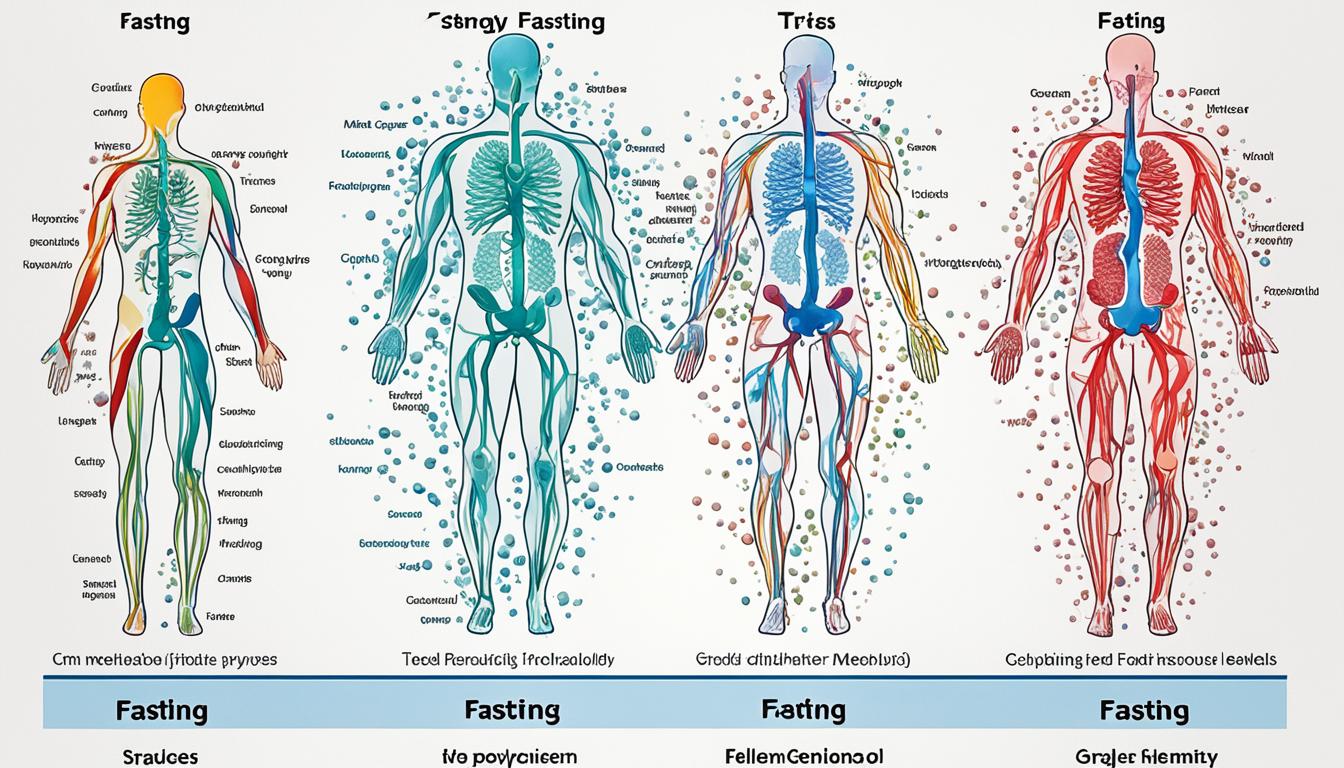Water fasting is an old yet researched practice that means not eating or drinking anything except water. It comes from old religious and spiritual beliefs but is now also done for weight loss and health benefits. Studies today show that water fasting might lower risks for cancer, heart disease, and diabetes. It makes your cells clean up, but it can also have some bad effects. To really understand water fasting, we need to look at both history and what scientists know now.
Key Takeaways
- Most fasts without food or drink are only for 24 to 72 hours and should be done with a doctor’s advice.
- Research suggests that fasting on water may lower chances of getting certain cancers, heart issues, and diabetes.
- Studies on animals show that not eating for a while might help cells clean up better, a process called autophagy.
- Fasting can make your body handle insulin and leptin better, which is good for your metabolism.
- But, doing a water fast without looking out for issues like being too dry inside, messing up your body’s salt, or health problems can be risky.
Introduction to Water Fasting
Water fasting means you only drink water, leaving out all other food and drinks. People do this for 24 to 72 hours, but it can go longer with a doctor’s care. At the TrueNorth Health Center, Alan Goldhamer leads fasts for over 10,000 people. Their supervised approach shows how water fasting can be safe and helpful.
What is Water Fasting?
Water fasting is when you only drink water, avoiding food and drinks. It’s liked for its simple rules and benefits. At the TrueNorth Health Center, many saw their blood pressure go down a lot. In fact, among 174 patients, their stage III hypertension dropped by 60 points thanks to these fasts.
Historical Context and Modern Trends
Fasting has been used in many cultures for spiritual reasons. Today, it’s gained popularity for health, promising quick weight loss and better heart health. Water fasting can boost your body’s ability to manage sugar and fat, and it helps clean up old cells too.
Many medical studies, in places like JMPT and JACM, share new discoveries about fasting. The TrueNorth Health Center is actively learning how fasting affects issues like obesity and high blood pressure. We can expect to learn a lot from what they find.
| Study Focus | Key Findings |
|---|---|
| Blood Pressure | Average drop of 60 points in stage III hypertension |
| Metabolic Health | Improved insulin and leptin sensitivity |
| Obesity & Hypertension | Planned studies on biogenetic markers pre and post-fasting |
Water fasting is becoming more popular because of its health promises. But it’s important to be careful, especially if you’re thinking about doing it for a long time without a doctor’s advice.
Water Fasting and Cardiometabolic Health
Water fasting is getting noticed for helping with health issues like heart problems and high blood sugar. Doing just water for a while might really help boost your health numbers.

Impact on Blood Pressure
Water fasting can be great for your metabolic health and especially your blood pressure. Some studies show that if you water fast for a bit and then eat only plant foods, your top number in blood pressure could lower. Lowering blood pressure is big because it cuts our heart disease risk.
Effects on Insulin Sensitivity
When you fast for your health, it can make your body work better with insulin. This means it can help keep your blood sugar in check and lower how likely you are to get type 2 diabetes. But keep an eye on your insulin levels after you start eating again.
Changes in Lipid Profiles
For some, water fasting lowers bad cholesterol and betters signs like hsCRP. But, some might notice their triglycerides go up for a bit after eating again. It’s key to watch your cholesterol and fats levels. You want to make sure fasting does more good than harm.
Fasting plans are still being looked into by scientists. They offer a mix of good and important things to keep in mind for better cardiometabolic health.
How Water Fasting Affects Your Body: A Scientific Perspective
When you water fast, your body goes through many changes. These changes lead to health perks like autophagy, shifts in hormones, losing weight, and keeping muscles.
Autophagy and Cellular Rejuvenation
Autophagy involves cells breaking down and recycling parts of themselves. It gets a boost during fasting, cleaning out damaged cells and keeping the rest healthy. Evidence from studies, such as one on mice doing intermittent fasting (Kim et al., Scientific Reports, 2019), shows how autophagy can stop diseases and extend life.
Hormonal Adjustments During Fasting
Fasting changes hormone levels in a good way for your health. It does things like make insulin and leptin work better. This helps with body metabolism, keeping blood sugar in check, and avoiding obesity (Trepanowski et al., JAMA Internal Medicine, 2017). The swing in hormones while fasting gives it a strong health boost.
Weight Loss and Muscle Preservation
Many people try water fasting to lose weight. But, it’s also important to keep your muscles. A study compared fasting every other day to eating less every day (Catenacci et al., Obesity, 2016). It found that keeping muscles means carefully choosing how you start eating again after fasting. This approach helps lose fat but keep muscles.
| Study | Effects | Participants |
|---|---|---|
| Tinsley G. M., La Bounty P. M. (2015) | Significant changes in weight and metabolic parameters | Humans |
| Trepanowski J. F., Kroeger C. M. (2017) | Weight loss and cardioprotection | Obese adults |
| Catenacci V. A., Pan Z. (2016) | Weight loss differences | Obese adults |
| Kim Y. H., Lee J. H. (2019) | Metabolic benefits | Mice |
Risks and Side Effects of Water Fasting
Water fasting offers health benefits but also comes with fasting health risks. Knowing about these water fasting side effects is important. It helps people think carefully before starting a fast and to be safe.

Dehydration and Electrolyte Imbalance
Without food, dehydration is a key dangers of water fasting. It lowers the body’s water levels and can mess up electrolytes. This might cause headaches, make you dizzy, or feel sick.
Potential for Nutrient Deficiency
Staying away from food for a long time leads to a lack of nutrients. This can harm the body and cause problems needing careful eating after fasting. Getting help or advice from a doctor is crucial for safety during a long water fast, as Healthline explains.
Medical Conditions Worsened by Water Fasting
Some health issues get worse with fasting, including gout, eating disorders, or diabetes. Those in certain groups like the elderly, pregnant people, and kids shouldn’t fast without medical supervision. The risks for them are too great.
It’s key to fully grasp the dangers of water fasting and the fasting health risks. Always have a doctor check on you during a water fast to keep you safe.
| Risk | Symptoms | Prevention |
|---|---|---|
| Dehydration | Headaches, dizziness, lightheadedness | Maintain hydration, monitor water intake |
| Electrolyte Imbalance | Nausea, muscle cramps, irregular heartbeat | Monitor electrolyte levels, consider supplements |
| Nutrient Deficiency | Weak immune function, increased fatigue | Careful refeeding with nutrient-rich foods |
| Exacerbation of Medical Conditions | Aggravation of existing health issues | Seek medical advice, continuous monitoring |
Scientific Research on Water Fasting
Water fasting is a key topic in many scientific studies. It’s known to greatly impact health. For example, Dr. Alan Goldhamer has led many patients through water fasts at the TrueNorth Health Center.
They’ve worked with over 10,000 patients across 30 years. These efforts show a strong interest in fasting from a scientific view.
Key insights come from places like TrueNorth. Studies published in respected journals offer valuable findings. Take the case of 174 patients with high blood pressure. They saw a 60-point drop, showing fasting’s potential to help with heart health.
The TrueNorth Health Foundation works on public education and further fasting studies. They’re looking at how fasting affects obesity and high blood pressure. This research could change how we understand metabolic health.
Looking at safety is important in fasting studies. A study with 2,000 patients explored the risks. It found that fasting might lower the risk of diseases like diabetes. But, it still poses some dangers, needing careful medical watch.
Research also points to benefits like triggering autophagy. This is a process where the body cleans out old cells. Medically supervised fasts can also boost how the body handles insulin and leptin. This could be key in fighting off chronic diseases.
In conclusion, though research is encouraging, caution is advised. Proper study and medical oversight are essential for the safe use of water fasting.
Conclusion
Evaluating water fasting shows a mix of good health benefits and risks. Research, seen in JAMA Internal Medicine 2017, points out how fasting can help with weight loss and protect the heart. Other studies, like those in the Journal of Physiology and Pharmacology 2018, found that fasting can help with obesity and type-2 diabetes.
Findings from The New England Journal of Medicine 2019 suggest fasting might help with health, aging, and fighting off diseases. But, all these studies say the same thing: fasting needs to be balanced. This way, people can get the good without the bad. Nutrition Reviews 2015 also showed that smart fasting can help with body composition and health markers.
Water fasting is a strong tool for health but it’s not simple. It helps regulate metabolism, improves your mood, and helps you lose weight. But, it has its risks. So, fasting should always involve a doctor’s advice.
By matching fasting with your health needs and goals, you can make the most of it while staying safe.




